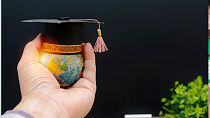By Rosaleen McMeel
“Every company culture in the world just changed,” says Steve Cadigan, future of work expert, global speaker and author of Workquake. “How and where people work, communicate and so many other pieces of interaction in a company have shifted since the pandemic.
“The psychology of the workforce has changed too, as many people hit pause on the life they were living and had a chance to observe it from a different perspective. Going through this is reshaping how people see their reality and we are seeing people make a change.”
As a talent strategist and company culture expert responsible for building world-class teams and company cultures at some of the world’s most respected organisations, Cadigan has had a ringside seat to the changes taking place.
He believes the most important skill today is adaptability: “This is a skill we all sharpened the past few years and continue to sharpen.”
Leaders also need to adapt
Workers alone aren’t impacted by the changes, but business leaders too. The ultimate challenge these past few years, especially for firms with large percentages of knowledge workers, is learning a new dance.
Can we win and be productive as a company working in a different way? Can we be confident with something we have never done before?
Leadership training, traditionally, has been about teaching how to realise consistent and reliable outcomes – the pandemic heaped dozens of new challenges, which forced leaders to accept that the best practice today is experimentation.
“A one-size-fits-all leadership style cannot and will not work today. Different teams can and must work differently because they have different needs, personally, and different business challenges, professionally. So we have to experiment across the company to learn who and what teams and individuals deliver the best results in which settings.”
Despite the reverberations being felt around the world and in every industry, there are some who are still holding out for a return to the way things were.
“It’s not going to happen – EVER. The new normal is never normal,” says Cadigan. “To be fair, this is extremely stressful on leaders and organisations. Nothing has prepared us for this. No MBA or University has a major in changing your business model, culture and work style overnight.
“Leaders are afraid they might not be able to deliver the same results in this new methodology… So how do we address that? We measure our ability to change over time. Most leaders I speak to today are pleasantly surprised by how resilient their teams and company have been. Crises have a way of bringing people together.”
Flexible schedules are key
With more and more companies embracing flexible working options, the workforce is better able to manage day-to-day life admin, such as daycare, grocery shopping or dental appointments.
“The nine to five schedule limits the ways and times you can take care of important things,” says Cadigan. “Flexibility allows more life satisfaction so you can shop and not have to fight at the grocery store on the weekends, but go Tuesday morning instead. Flexible work solves childcare issues too, which is a big stressor for many families.
Careers are experiments
All this disruption prompts the question: What will a career look like in the future?
“At the core, we need to reimagine what a ‘career’ means,” says Cadigan. “It no longer means staying in one place or having to stay in one industry, necessarily.
“I have always believed that careers are essentially experiments where you go from one opportunity to the next and seek to learn more about what you love doing, where you love doing it, and what you do that others value greatly.
“We are humans and we find more energy in change than we do in staying in the same place. Today we are seeing more pivots and career path changes than at any time in history.
“I think on one level this is fantastic. But for companies not prepared for all this change, it's a horror show they’re not ready to face.”
What can workers do?
For school leavers or those getting ready to enter the workforce, Cadigan suggests focusing on soft skills.
“Your capacity to communicate well, to collaborate, to inspire, to empathise, to lead, these are skills that no robot can replicate and what sets you apart and distinguishes you. Liberal Arts are wonderful domains to build these abilities.
“One of the most important skills for the future is the capacity to have hard conversations. Therapy is a great training ground for this, but sadly there is great stigma still for people to pursue therapy.
“The other super important ability in the future is learning velocity. Building your capacity to learn things quickly and apply them fast is going to be so important. Having a growth mindset and being curious are essential in this.
“When we look at hard skills today we see their shelf-life value coming down to five to 10 years. This means you are going to need to keep learning and unlearning prior hard skills.”
Unlock your career potential and discover open opportunities via Euronews.Jobs today.






